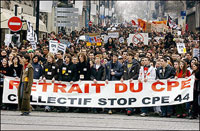JOBS ARE A RIGHT!
Students, workers plan general strike in France
By
LeiLani Dowell
Published Mar 23, 2006 1:36 AM
All major French union confederations and
student bodies called on March 20 for a general strike and protest marches on
March 28 to pressure the government to withdraw a job law that would allow
workers under 26 to be fired without reason.
In France, unlike in the
United States, workers’ right to their jobs is protected by law, and it is
difficult for management to fire workers once they have been hired. The new law
would set up a two-tier system, removing that right to a job from young
people.
The call for a general strike follows massive demonstrations on
March 18 when more than 1.5 million people—including high school and
college students, workers, retirees and families—protested in the streets
against the new law.
According to the French Press Agency (AFP), police
fired tear gas and assaulted scores of demonstrators with water cannons.
Hundreds of youth fought the cops, smashing windows, overturning vehicles and
hurling objects at the cops for six hours. One trade unionist, beaten
mercilessly by police, lies in a hospital in a coma.
Actions on campuses,
including strikes and sit-ins, have affected 60 of the country’s 84
universities, with 21 closed and 37 others “badly disrupted.”
Protests have also occurred in dozens of high schools.
The First
Employment Contract (CPE) was pushed forward by French Prime Minister Dominique
de Villepin, without consultation with youth or trade unions. The government
also used a constitutional article to hasten the law’s passage by limiting
parliamentary debate.
CPE offers a two-year contract for youth that
Villepin claims will ease unemployment. However, the law’s provision that
youth can be fired at will actually make it more difficult for them to find and
hold long-term employment. In addition, AFP reports that the financial
compensation for those fired will be less than for those on current short-term
contracts. The law would apply to all youths under 26, whether the job is their
first or not, despite the word “first” in its
name.
U.S.-style work rules
Austria’s Der Standard
magazine said the CPE is an attempt to introduce U.S.-style “hire and
fire” rules to the country.
The government deceptively framed the
law as part of “equal opportunities” legislation after youth
rebellions in November of last year. While overall youth unemployment in France
is 23 percent—one of the highest rates in Europe—it is as high as 50
percent in the largely African and Muslim immigrant suburbs where the rebellions
took place last fall.
The government is now attempting to divide the youth
to diminish their power. As opposed to the college students, the youth involved
in the unrest on March 18 were labeled “hooligans and thugs from a number
of neighborhoods” by Interior Minister Nicolas Sarkozy. France’s
daily newspaper Liberation pointed out the flaw in the right-wing
minister’s argument: “As if many young people in the suburbs were
not also students ... as if those excluded from the education system did not
also hope to escape the threat of unwarranted dismissal.”
In fact,
youth interviewed in the suburbs say they support the efforts of the students on
the campuses and understand the implications of the law. According to the
Associated Press, “Youths [in the suburbs] do not expect any quick results
from the contract and wonder how it is any different from temp work. They insist
it does not solve the real problem for them: discrimination because of their
foreign-sounding names and addresses in the troubled
suburbs.”
Mohammed, a 20-year-old in the suburb of Clichy-Sous-Bois,
said, “This contract just means two years of anxiety. Villepin is lying
when he says it’s for us.”
Critics of the protests claim that
the youth are being naïve about their pro spects for a future in a
neoliberal society. London’s Daily Telegraph editorializes, “[The
protests] constitute a rejection of globalization, a refusal to accept that the
opening of the world economy ... has rendered the old French social contract
unaffordable.”
Yet the protests in France accompany the growing
struggle against globalization that is occurring around the world, most notably
in Latin America, with successes along the way. According to an opinion poll
taken on March 17, almost 70 percent of the French public now opposes the CPE.
Unions continue to support the effort of the youths, knowing that unity is
strength and also that the CPE is a stepping stone to the erosion of labor laws
for all French workers.
Bruno Julliard of the UNEF students’ union
told AFP, “Today we can clearly see that the mobilization is stronger than
ever. Either the government listens to reason and withdraws the CPE, or it will
be obliged to do so next week—because we will be back in the
street.”
Despite the outpouring of opposition, Villepin has called
only for “dialog” and refused to offer the rescinding of the CPE as
an option. Following this refusal, France’s main union confederations and
university and high-school students met on March 20. “All the unions are
calling to make March 28 a day of demonstrations, strikes and work
stoppages,” said Rene Valadon, secretary of the Force Ouvriere (FO) union
confederation. The two other major union groups, the CGT and the CFDT, also
support the call for a general strike.
Articles copyright 1995-2012 Workers World.
Verbatim copying and distribution of this entire article is permitted in any medium without royalty provided this notice is preserved.
Workers World, 55 W. 17 St., NY, NY 10011
Email:
[email protected]
Subscribe
[email protected]
Support independent news
DONATE


